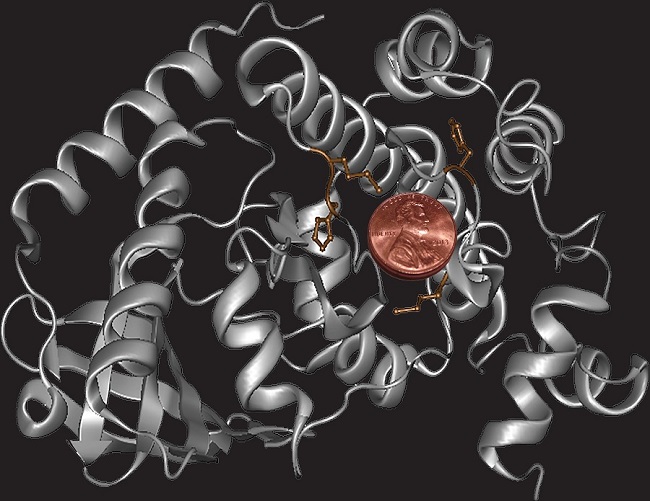Metals Targeted in Search for New Cancer Therapies
Innovative research by Donita Brady builds on feedback from the community of more than 600 Pew biomedical scholars.

A ribbon model illustrates Pew scholar Donita C. Brady’s research into how excess copper (represented by a penny) might affect the structures of key proteins in cancer—work that could lead to a new form of anti-cancer therapy.
© Donita BradyThe thing that excites Donita C. Brady, Ph.D., the most about research is that it allows her to do and learn something new every day.
“It’s really uncharted territory,” Brady said. “We get to be the first to look into this.”
Brady is an assistant professor in the Department of Cancer Biology at the University of Pennsylvania, and a 2016 Pew biomedical scholar. In her lab, she studies the metallic elements from the central block of the periodic table, which are also known as transition metals. Her primary focus is on copper.
Although copper can be important to many systems in the human body, Brady discovered—as a postdoctoral fellow at Duke University—that too much of it can elevate risks for certain cancers. She now explores where excess copper comes from, and how it interacts with proteins to drive cell division. “If we can learn these basic things about copper, we can begin to implement them into different human conditions,” she said. Findings from her work could lead to a novel form of anti-cancer therapy based on drugs that can sequester excess copper.
“The way we think about copper, and its ability to help with cell communication and how a cell decides to divide, is unique,” Brady explains.
By focusing on transition metals, Brady and her team are exploring what is an understudied field. Transition metals are interesting because they can be used to pause chemical reactions in the body.
Throughout her education, Brady had become aware of Pew’s biomedical scholars program, which supports the work of promising early-career scientists who are pursuing innovative research to advance human health.
“I had heard really wonderful things about Pew’s program and community,” Brady said. “Being able to go to the annual meetings and meet junior faculty from other institutions gives you a different perspective.”
Over the past year, Brady has connected with several members of the 2016 class and gained insights on grant opportunities and possible future collaborations. Pew’s program has also given Brady a boost of confidence as she’s begun her research as an assistant professor.
“Support for early-career research is what helps us get things off the ground,” Brady said. “It allows you to think big about a research topic that wouldn’t necessarily be funded by other mechanisms. A Pew award lets new investigators have time to explore ideas that are still developing.”
Brady hopes that other scientists who are early in their careers will also explore creative research opportunities. Her advice to those at a similar stage? “Find the important questions in your field and try to think outside the box for answering them.”
Kara Coleman directs The Pew Charitable Trusts’ biomedical programs, including the biomedical scholars, Pew-Stewart Scholars for Cancer Research, and Latin American fellows programs.






